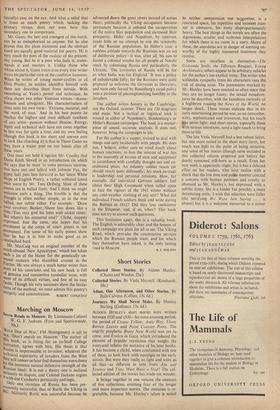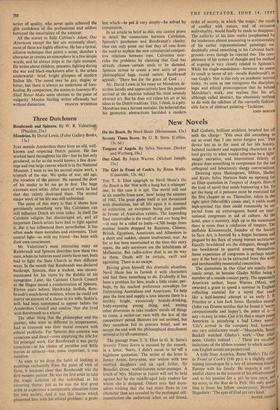Short Stories
Adam, One Afternoon, and Other Stories. By Halo Calvino. (Collins, 13s. 6d.) Journeys We Shall Never Make. By Monica Stirling. (Gollancz, 13s. 6d.) ALDOUS HUXLEY'S short stories were written between 1920 and 1930—his most amusing period, the period of Crome Yellow, Antic Hay, Those Barren Leaves and Point Counter Point. The angrily. prophetic Brave New World was yet to come, and Eyeless in Gaza, which introduced the element of popular mysticism that weighs the irony.and inflates the narrative of his later books. It has become a cliché, when confronted with one of these, to look back with nostalgia to the early novels. But were they really as light and witty as all that—as different in tone from Ape and Essence and Time Must Have a Stop? The col- lected edition of the stories has made inc wonder.
It brings together in one volume the contents of five collections, omitting four of the longer and more important stories. The omission is re- grettable, because Mr. Huxley's talent is suited • to neither compression nor suggestion; in a restricted space, his repetitive and insistent man- ner is obtrusive, his irony disproportionately heavy. The best things in the novels are often the digressions, erudite and scabrous interpolations for which there is no room in a story. Shorn of these, the anecdotes are in danger of seeming un- worthy of the highly mannered treatment they receive.
Some are excellent in themselves—The Gioconda Smile, the Tillotson Banquet, Young Archimedes; others appear to be arbitrary vehicles for the author's too explicit irony. The writer who withholds sympathy from his characters runs the risk of dating soon. The pretensions mocked by Mr. Huxley have been mocked so often since that they are no longer funny; the sexual misadven- tures he describes, with the fastidious curiosity of a highbrow reading the News of the World, no longer shock. These stories indicate that in his early entertaining period he was, as we remember, witty, sophisticated and irreverent, but his touch -ws never light; and short stories, especially those With serious intentions, need a light touch to bring them to life.
The late Viola Meynell had a less robust talent, but one more suited to the short story form; her touch was light to the point of being tentative, and some of her stories (though none included in this collected edition prepared just before her death) remained still-born as a result. Even her best work is apparently slight, but it has a delayed effect on her readers, who later realise with a shock that the low tone and polite manner conceal a concern with human pettiness and cruelty as obsessed as Mr. Huxley's, but expressed with a subtler irony. She is a kinder but possibly a. more devastating critic. 1 NN ish this selection were fuller (the terrifying We Were Just Saying . . . is absent) but it is a welcome memorial to a minor
writer of quality, who never quite achieved the gJib confidence 'of the professional and seldom betrayed the uncertainty of the amateur.
All the stories in halo Calvino's Adam, One Afternoon except the last are extremely short; most of them are highly effective. He has a lyrical, allusive technique that paints a scene, sketches a character or creates an atmosphere in a few simple words, and he always stops at the right moment. He writes about children, peasants, fighting during the war and black-marketeers after it, the urban underworld: brief, bright glimpses of modern Italian life. The mood may be gay, elegiac or bitter, but there is always an undertone of fore- boding. By comparison, the stories in Journeys We Shall Never Make seem obvious to the point of vulgarity. Monica Stirling writes efficiently but



































 Previous page
Previous page